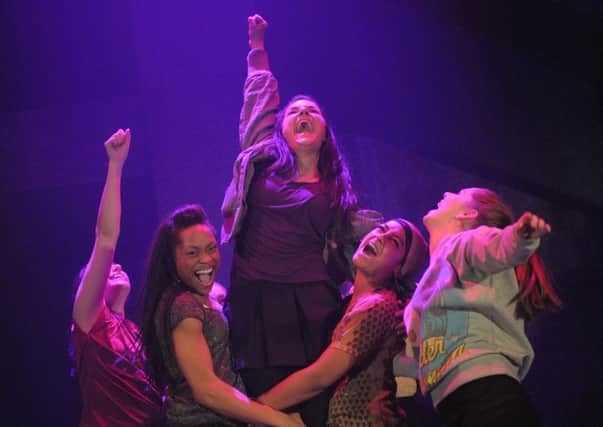Joyce McMillan: Edinburgh Fringe shows with powers of persuasion


Can theatre ever change the world? Thousands of years on from the moment when human societies first gathered to retell stories that would make them laugh, cry and reflect on their past and future, the question remains an open one. Yet still, the public arena of theatre remains an irresistible space for people who want radical change; and every year, during the Edinburgh Fringe, the judging panel for the Amnesty Freedom Of Expression Award gathers to decide on a shortlist of Fringe shows that contribute, in a clear and purposeful way, to the cause of freedom that Amnesty International exists to champion, worldwide.
It’s always a difficult choice; arguably almost every show on the Fringe contributes to the cause of freedom of expression in some way, simply by being there. I can’t recall a year, though, when the shows chosen for the Amnesty shortlist used such a dazzling range of styles and forms to try to break down the indifference of audiences both to problems in relatively faraway places, and to abuses which lie uncomfortably close to home; and the sheer aesthetic range of the 2016 shortlist raises some fascinating questions about what political theatre looks like in the 21st century.
Advertisement
Hide AdThe winner of the 2016 award, for example, was Cora Bissett’s Glasgow Girls, a brilliant, beautiful piece of popular music theatre that comes straight out of the Glasgow agitprop-with-style tradition founded in the 1970s by David MacLennan and David Anderson of Wildcat, who in turn were inspired by the ceilidh-theatre style of John McGrath’s 7:84 Scotland. The show is based on the true story of six Glasgow schoolgirls who got together a decade ago to prevent their asylum-seeker school friends from being deported under draconian immigration rules; and every day of the Fringe, at the Assembly Hall, a capacity audience of more than 700 stood and cheered the kind of welcoming, loving attitude to refugees and asylum seekers that is supposed to be so unpopular in post-Brexit Britain, affirming the huge popular appeal of direct, upbeat, well-delivered agitprop that unashamedly tells you what to think, and seems all the more loved for it.
Yet even within the world of agitprop, there were some vastly different approaches this year. The Canadian-Ukrainian group Lemon Bucket Orkestra brought their show Counting Sheep to Edinburgh in order to spread the news about the yearning for freedom expressed in the Euromaidan revolution in Kiev, in the winter of 2013-14; but this fabulous, stylised “guerrilla folk opera” – this year’s Specially Commended show on the Amnesty shortlist – used a much less traditional technique than Glasgow Girls, throwing its mainly young audience into a full-blooded immersive re-enactment of the scenes in Maidan Square, as young people built barricades, fought against a brutal police response, and began to set up a new republic of freedom. The aim here was partly to challenge the assumptions of easy western individualism, and to show how a new collective awareness is born.
Phosphoros Theatre’s Dear Home Office, by contrast, used the most simple, powerful techniques of participatory youth and community theatre to bring us the real-life voices and presence of eight young refugees currently in the care of Harrow Council. And Pepperdine Scotland’s The Interference, written by Scottish-based playwright Lynda Radley, was a brilliantly-performed documentary-style analysis of a semi-fictional date rape by a famous football jock on a US campus, and of the ordeal undergone by his victim, when she decides not to remain silent.
And then there were the shows that used something close to pure fiction, informed by current events, to draw us into the same kinds of extreme situations. Audra Onashile’s play with song and dance, Expensive Shit, at the Traverse, drew on a recent real-life incident to conjure up the imagined life of Tolu, a Nigerian woman toilet attendant in a Glasgow club who has experienced stark forms of patriarchy twice, both when she was a young girl in the famous republic of freedom – for some – created by the great Nigerian singer Fela Kuti, and now in a Glasgow ladies’ room where one-way mirrors allow male customers to spy on women as they fix their hair and make-up.
There was Henry Naylor’s monologue Angel, using shreds of current media myth as the scaffolding for the mighty story of a joyful, ambitious, Beyoncé-loving young teenage pacifist who finds, when the war comes to her small border town between Syria and Turkey, that there is no option but to become one of a legendary troop of Kurdish women warriors. And there was Gaël Le Cornec’s beautiful solo piece The Other, at the French Institute, which began like a child’s fairy tale told in shadow-play, and ended, in a bold shift of theatrical form, with an unforgettable vision of the plight of a child refugee in some heartless western country, as cold in spirit as in climate.
And in the end, it’s hard to say whether any one of these shows was more likely than the others to change hearts and minds. True stories perhaps have a certain authority, in the age of “reality” entertainment, that even the best fictions may lack; yet for sheer, unsettling power to begin in one emotional place, and relentlessly move us to another, the fictional stories on the list were at least as powerful. And if Counting Sheep was the only show of the seven which actually took the audience on a physical journey from one space to another, every one involved the kind of journey of awareness that does change people, however subtly; and perhaps – on some time-scale far beyond any Edinburgh Festival – prepares the ground for the real change so desperately needed, by those millions whose yearning for freedom still remains unfulfilled.